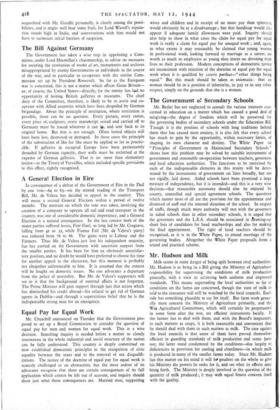Equal P.ay for Equal Work
Mr. Churchill announced on Tuesday that the Government pro- posed to set up a Royal Commission to consider the question of equal pay for men and women for equal work. This is a wise decision. Searching inquiry is needed before a matter so closely interwoven in the whole industrial and social structure of the nation can be fully understood. This country is deeply committed on now established democratic principles to the recognition of civic equality between the sexes and to the removal of sex disqualifi- cations. The justice of the doctrine of equal pay for equal work is scarcely challenged as an abstraction, but the most ardent of its advocates recognise that there are certain consequences of its full application which cannot be left out of account, and inquiry should show just what these consequences are. Married men, supporting
wives and children and in receipt of no more pay than spinsters, would obviously be at a disadvantage ; but that handicap would dis- appear if adequate family allowances were paid. Inquiry should also help to show in what cases the claim for equal pay for equal work is really a claim for equal pay for unequal work ; and, again, to what extent it may reasonably be claimed that young women in professional work, looking forward to marriage as a career, are worth as much to employers as young men intent on devoting their lives to their profession. Modern conceptions of democratic justice are inconsistent with rejection of the doctrine of equal pay for equal work when it is qualified by ceteris paribus—" other things being equal." But this much should be taken as axiomatic : that no woman should be in-a position of inferiority, in pay or in any other respect, simply on the grounds that she is a Woman.


























 Previous page
Previous page